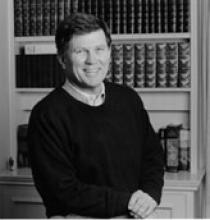What Is It
Is the military draft a natural expression of democratic values, or a challenge to our most basic concepts of individual rights and liberties? Are the values that make for an effective military consistent with the values that make for a free and democratic republic? If the government must have the power to defend the nation, does it follow that it must have the power to control events around the entire world? John and Ken enlist themselves in a discussion of the military and its role in public life with Pulitzer Prize winning historian David Kennedy, for a program recorded live at the Marsh theatre in San Francisco.
Listening Notes
Despite the title of today’s show, even John and Ken can agree that the military is probably useful for something. But, taking it for granted that any major nation which wishes to be a force on the world stage must have some military, that still leaves a ton of questions as to what kind of military we ought to have. Should we have a compact military that deals only with homeland defense? Or should we have a large, robust force that can project power around the globe? And who should serve? Everyone? Or only volunteers? Do we civilians owe our military leaders a great deal of respect? John and Ken feel that it goes to the heart of the nature of democracy that the people of the nation as a whole ought to consider these vitally important questions, yet this topic has been conspicuously absent from the public eye—even though we have been at war for the last decade! One reason for this lack of discussion may be the lack of a draft. If military service were compulsive, then there is no doubt that politicians and military leaders would have a more difficult time convincing the nation of the necessity of mysterious wars.
David Kennedy joins the discussion to offer some historical expertise. As to the question of the military’s purpose, David says that force is often necessary in our imperfect world, and can be needed to assert a nation’s interests. He then is quick to point out that, relatively speaking, our current military is incredibly small. Of course, times have changed since World War II. Sheer manpower is no longer as important as it once was, and David believes the benefits of an all-volunteer force greatly outweigh any possible reasons for a draft. John worries that the move towards a small, elite military carries with it a genuine danger. Will the people of America even be aware of the acts of violence carried out by our nation, or by its drones?
Robin from Daly City asks Ken, John, and David to confront the tough question of whether “willing” and “volunteer” accurately describe the vast majority of our military, many of whom may feel compelled by their economic circumstances. David agrees this is a vitally important issue, and he points out that military recruitment occurs disproportionately from rural counties, southeastern states, and from the least privileged sectors of our society.
In closing, John and Ken ask David what he feels are the most immediately practical steps that could be taken in response to issues raised over the last hour. David responds that there are two major dimensions, accountability and equitability. First, he would restore the total force doctrine of the 1970’s which would raise the threshold for demonstrating that a war is reasonable. Second, he would bring back ROTC at ‘elite’ universities to try and provide more connection between all sectors of society. Third, without imposing obligatory military service, he feels that some version of lottery could go a long way towards removing some of the perceived class boundaries within the military.
- Roving Philosophical Reporter (seek to 5:30): Caitlin Esch speaks with a Vietnam veteran who went through the draft process. Rick Collins, who grew up in a working-class neighborhood, ending up volunteering in order to choose what kind of job he could have in the war. He discusses his experiences coming before an all-white male draft board, and how it felt to be called “a babykiller” after returning from the war.
- 60-Second Philosopher (seek to 46:50): Ian Shoales reports for duty, informing us that the second amendment reminds us that “a well-regulated militia being necessary to the security of a free state, the right of the people to keep and bear arms shall not be infringed.” Yet he wonders if the American men and women who exercise this right today would still count as a well-regulated militia by twenty-first century standards.



